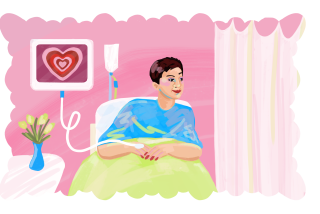‘Doc, am I going to make it?’
- Share via
To ME, teetering on the cusp of adulthood, he seemed old -- 47. He had heart disease, I’d read in the surgeon’s chart notes, and had been admitted for coronary bypass surgery. My job as a medical student was to follow the interns and residents and do yet another preoperative physical examination. The patient had been kind enough to allow one more person to take up his time.
I introduced myself and shook his hand, then, feigning confidence, pulled a chair next to his bed and brought out my folded pages of questions from the starched pocket of my short, white coat. Taking a deep breath, I began the classic sequence of interrogation, following a recipe refined by years of medical tradition. This included the “chief complaint” (the reason for being in the hospital), “past medical history” (the story behind the reason), “review of systems” (a checklist for health or disease in each organ system from head to toe), and “social history” (personal and life factors that could contribute to illness).
From our conversation, I learned that he’d had his first heart attack while in his early 40s. His family history and trim physique hinted that genes, not lifestyle, were the probable culprits. His father had died at a young age of a suspected heart attack, as had too many of his older male relatives. Despite my patient’s advanced coronary artery disease, his general health was fairly good. To my unpracticed eye, he looked more robust than I expected for his age.
He had no children but had been married for many years. He was a businessman, rather successful, and looking forward to returning to work as soon as possible. He was excited about tomorrow’s surgery, he said, and hoped it would give him a new lease on life after years of fearing a second heart attack.
I put down my pen and slipped my notes back in my pocket. “I just have to do a quick physical exam . . . “
Clutching my new, shiny black bag, I stood up self-consciously and tried to pretend that I was confident of my next moves. I had rehearsed doing physical examinations on my fellow classmates and drafted friends, but I was terrified that I would stumble in my first “live” performance. My biggest fear of public humiliation was that I would diligently complete all the necessary steps of the examination of the chest and heart and then notice I had failed to insert the earpieces of my stethoscope into my ears.
I carefully positioned the stethoscope and began to listen to my patient’s heart. Tomorrow its lifelong task of providing blood and oxygen to his vital organs would be temporarily halted. His blood would be channeled away from his heart and through a machine that would filter and oxygenate it before returning it to his body. The blood detour would allow the surgeon a brief window of time to replace sections of blocked coronary arteries with pieces of unblocked leg veins. Then, the detour would be removed and his heart would resume its function.
My patient’s heartbeat was deceptively strong and regular, its thump-thump-thump a processional drum that guided my stethoscope along the chest and abdomen.
He waited until after I had finished my meticulous exam and was jotting down my findings back by my chair.
“Doc, am I going to make it?”
His voice wavered, his pleading eyes looked up at me. I hesitated and looked down at my notes. I had neglected to include questions about life and death in the script I had carefully written and rehearsed the night before.
Coronary bypass surgery has become a relatively common and lifesaving procedure today. But about 25 years ago, only a few medical centers in each major city performed this intensive and, then, risky surgery. Survival was not remotely guaranteed. I didn’t know what to tell him. I didn’t know what would happen. I was a 21-year-old student. I wasn’t a doctor. I wasn’t God.
And I had to say something. My fingers brushed the smooth surface of my fresh white coat. Wearing it had transformed me in his eyes from a young adult to an ambassador of wisdom. The green student had been vested by her patient as a medicine man.
I took another deep breath. “Of course. It’ll go just fine, you’ll do great.” The words stumbled out of my mouth that first time. The years of practice with the line that would eventually make it second nature were still ahead of me. I hoped that my delivery seemed convincing -- the worried look in my patient’s eyes made me forget my beginner’s nervousness for a few moments and wish only to help him feel more reassured.
He seemed eager to believe me. Smiling, he laid back on his bed and reached out a hand to meet mine. “See you tomorrow.”
“Tomorrow,” I nodded, as I left. “Thanks. Have a good night.”
I slept very little that night. By the time I got to the hospital the next morning, my patient was already in the operating room being prepared for surgery by the anesthesia staff. I joined his doctors in the adjacent scrub room.
Lowest on the totem pole of the medical hierarchy, medical students were expected to stand near the surgeons and hold retractors, the long metal hooks that kept unwanted tissue out of the surgical field. Balancing on tiptoes, I could barely observe the progress of the operation over the shoulders of green-gowned interns and residents adjacent to the cardio-thoracic surgeon. I could see enough, however, to follow the opening of the chest, the establishment of the heart bypass detour and the beginning of surgery on the tiny coronary arteries.
The work proceeded slowly and methodically, even as my patient’s muscular heart bobbed and weaved with irregular contractions. My eyes often wandered to the fragile machine near the table through which thin tubing was guiding my patient’s blood. I worried that this mechanical collection would fail in its critical job.
After an eternity, the artery replacement was complete. We all held our collective breath as the blood detour was shifted back to the heart for the heart to resume its regular rhythm. It didn’t. Medications, defibrillation, direct massage. All futile. My patient’s heart lay devastatingly still. His tomorrows were gone.
The primary surgeon, deathly pale, sat alone in a corner of the operating room, silent, holding his head in his hands. I looked at my patient’s still form, lying peacefully among the now-silent machines. His eyes were closed, his mouth was slightly open, and I could still hear his words in my ears: “Am I going to make it?”
And the tears came as my mind cried, “I don’t know, and I am so sorry.”
Not so long ago, I turned 47. And I remembered my patient. He was very young. And, unlike that medical student who sat with him years before, I am well aware that the happy endings and tomorrows we pray for don’t always come. When I get the question now, “Doc . . . ?,” my answer hasn’t changed. “Of course. You’ll do great.”
Despite my white coat, I am, in truth, just like them, only making a wish for a good outcome, one that I sadly can’t guarantee. My patients are seeking a shaman, but I’m just a medicine man. All I can give them is hope.
--
Dr. Linda Reid Chassiakos is director of the Klotz Student Health Center at Cal State Northridge and an assistant clinical professor of pediatrics at UCLA.
More to Read
Sign up for Essential California
The most important California stories and recommendations in your inbox every morning.
You may occasionally receive promotional content from the Los Angeles Times.













